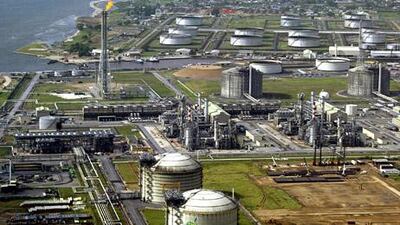Nigeria, an Opec+ member and Africa’s biggest oil producer, is reforming its oil and gas sector to help it weather market uncertainties, according to the country’s oil minister.
A Petroleum Industry Bill, which is currently going through statutory legislative processes at the national assembly, will “improve the technical, operational, environmental and regulatory efficiency in the operations of the industry and ensure its survival in the increasingly competitive market for the economic benefits of the country,” Timipre Sylva, Nigeria’s minister of state for petroleum resources, said.
The bill, which has been in the works for nearly two decades, is also expected to encourage investment in the oil and gas industry, Mr Sylva said, without specifying when the new bill will come into effect.
“Nigeria sits on proven crude oil reserves of about 40 billion barrels and natural gas reserves of about 600 trillion cubic feet, the largest in Sub-Saharan Africa,” Mr Sylva said. “With such vast oil and gas resources threatened by glaring market uncertainties, Nigeria has set out appropriate programmes and policies to enhance adaptation to these new realities.”
Mr Sylva made his remarks on Wednesday as part of Abu Dhabi International Petroleum Exhibition and Conference, which is being held online due to the coronavirus pandemic.
“Of equal importance is the Nigerian gas master plan and policy, aligned to maximise the gas sector across the value chain. The aim is to boost the domestic gas market and obtain the maximum from these resources.”
Demand for oil has been “seriously dented and devastated” due to the coronavirus pandemic, he said. The International Energy Agency forecast a 5 per cent drop in global energy demand this year – seven times larger than the decline after the 2008 financial crisis – to 91.7 million barrels per day.
Nigeria’s economy, which is largely dependent on oil revenue, is projected to shrink by 4.3 per cent this year due to the coronavirus pandemic, according to the International Monetary Fund.
“Investment in the industry has drastically dwindled and the oil business is no longer as usual, while a bleak future has been painted for all over the industry. There can be no better time to vigorously pursue strategies that will accelerate the resilience of the oil industry,” Mr Sylva said.
Nigeria will lend its full support to efforts being made by Opec+, the producer alliance led by Saudi Arabia and Russia, to balance the oil market, he said.
“It is fully committed to the objectives of the declaration of cooperation between Opec and non-Opec members.”
Opec+ is currently reducing output by 7.7 million barrels of oil per day.
Nigeria’s oil production stood at 1.48 million barrels per day last month, according to Opec’s latest monthly report based on secondary sources.


